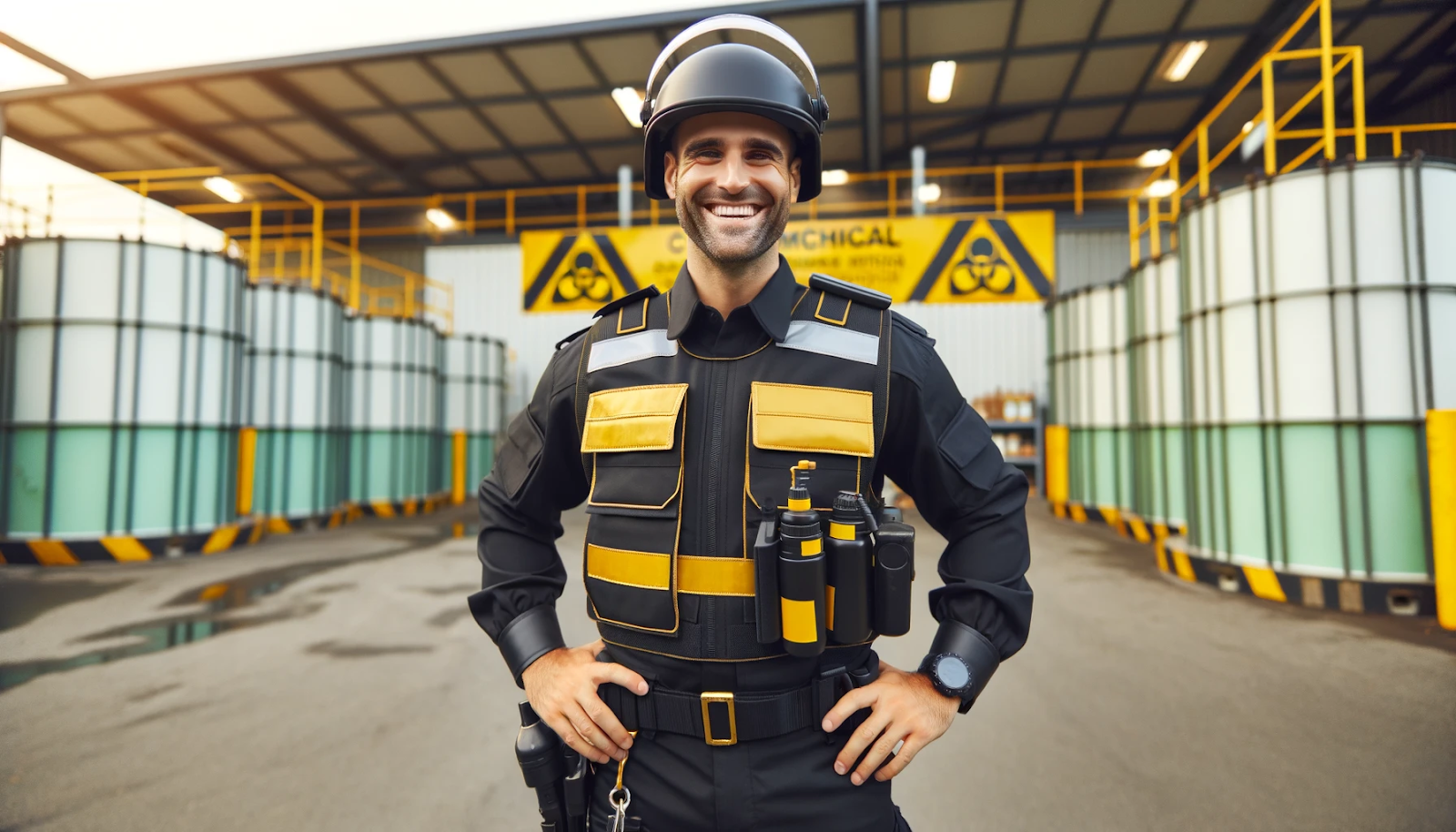Chemical threats are a serious concern for property managers, chief security officers, and security company hiring managers. Ensuring that security guards are adequately trained and prepared to handle chemical threats can significantly protect people and property. This blog post will explore essential training and precautions for security guards to handle or respond to chemical threats or exposures safely.
Understanding Chemical Threats
Security staff must have a foundational understanding of chemical threats. Chemical threats can come from various sources, including industrial accidents, terrorist attacks, and accidental spills. Security guards need to recognize the different types of chemicals and their potential hazards, which include:
- Toxic Chemicals: Can cause serious health effects or death.
- Corrosive Chemicals: Can damage skin, eyes, and respiratory systems.
- Flammable Chemicals: Can cause fires or explosions.
Essential Training for Security Guards
1. Hazard Communication
Security guards should be familiar with the Hazard Communication Standard (HCS), which requires the use of labels and safety data sheets (SDS) for chemicals. This training should cover:
- Reading and understanding chemical labels.
- Interpreting safety data sheets.
- Identifying and understanding hazard symbols.
2. Personal Protective Equipment (PPE)
Proper use of personal protective equipment is crucial for handling chemical threats. Training should include:
- Selecting the appropriate PPE for different chemical hazards.
- Correctly donning and doffing PPE.
- Maintaining and storing PPE properly.
3. Emergency Response Procedures
Security guards need to know how to respond effectively during a chemical incident. This includes:
- Evacuation procedures.
- Containment strategies.
- First aid measures for chemical exposure.
- Communication protocols with emergency responders.
Precautions to Ensure Safety
1. Regular Drills and Simulations
Conducting regular drills and simulations helps security staff practice and reinforce their response procedures. These exercises should mimic real-life scenarios and include:
- Evacuation drills.
- PPE drills.
- Decontamination procedures.
2. Site-Specific Training
Each site has unique chemical hazards. Security guards should receive training tailored to their location's specific chemicals and risks. This includes:
- Identifying site-specific chemicals and hazards.
- Understanding site-specific emergency protocols.
- Knowing the location of safety equipment, such as eyewash stations and emergency showers.
3. Continuous Education and Refresher Courses
Chemical safety is an evolving field. Regular refresher courses and continuous education ensure that security guards stay up-to-date with the latest safety practices and regulatory requirements.
Responding to Chemical Exposures
Immediate Actions
When a chemical exposure occurs, prompt action is essential. Security guards should:
- Assess the Situation: Determine the type of chemical and the extent of the exposure.
- Evacuate and Isolate: Move affected individuals to a safe area and isolate the exposure site.
- Administer First Aid: Provide immediate first aid, such as rinsing exposed skin or eyes with water.
Reporting and Documentation
After an exposure incident, thorough reporting and documentation are crucial. This includes:
- Notifying emergency services and site management.
- Documenting the incident, including the type of chemical, the circumstances, and the response actions taken.
FAQs
Q: What should security guards do if they cannot identify a chemical?
A: Evacuate the area, isolate the site, and contact emergency responders immediately.
Q: How often should security guards undergo chemical safety training?
A: At least annually, with additional site-specific training as needed.
Q: What is the most important piece of PPE for chemical threats?
A: The most critical piece of PPE depends on the chemical hazard, but generally, respiratory protection is crucial.
Q: Can security guards handle chemical spills on their own?
A: Only if they have received proper training and it is safe to do so. Otherwise, they should contact specialized emergency responders.
Q: What are the common signs of chemical exposure?
A: Symptoms include skin irritation, respiratory issues, dizziness, and chemical burns.
Training and precautions are fundamental for security guards to manage chemical threats safely. Security staff can effectively protect themselves and others from chemical hazards by understanding the types of chemicals, using appropriate PPE, and knowing the correct response procedures.
.png)
.png)
.png)

.png)
.png)

.png)
.png)
.png)
.png)
